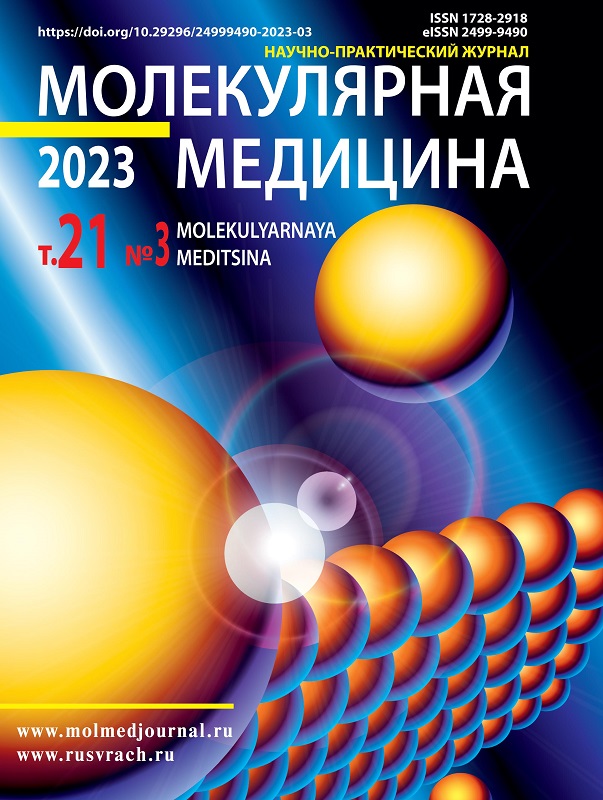Влияние полипептидных комплексов на стимуляцию клеточной пролиферации тканей экспериментальных животных
- Авторы: Рыжак Г.А.1,2,3, Чалисова Н.И.1,2,3, Иванова П.Н.1,2,3, Егозова Е.С.1,2,3
-
Учреждения:
- Институт физиологии им. И.П. Павлова РАН
- Санкт-Петербургский Институт биорегуляции и геронтологии
- Российский государственный педагогический университет им. А.И. Герцена
- Выпуск: Том 21, № 3 (2023)
- Страницы: 39-42
- Раздел: Оригинальные исследования
- URL: https://journals.eco-vector.com/1728-2918/article/view/568208
- DOI: https://doi.org/10.29296/24999490-2023-03-05
- ID: 568208
Цитировать
Полный текст
Аннотация
Введение. Актуальной задачей современной молекулярной биологии и медицины является исследование механизмов регулирования многоклеточных систем и сложного равновесного состояния между клеточной пролиферацией и апоптозом в тканях организма.
Цель исследования. Целью исследования было выявление влияния полипептидных комплексов (ППК) и соответствующих коротких пептидов на клеточную пролиферацию в тканях печени, мочевого пузыря млекопитающих и птиц.
Метод. Метод органотипического культивирования тканей печени и мочевого пузыря крыс и 17-дневных эмбрионов цыплят использовался для быстрого скрининга биологической активности исследуемых веществ.
Результаты. Установлено тканеспецифическое влияние ППК и содержащихся в них коротких пептидов на ткани животных различных видов, Индекс площади эксплантатов статистически достоверно увеличивался на 21–29% по сравнению с контролем.
Заключение. Полученные данные создают базу для разработки и быстрого тестирования препаратов, предназначенных для лечения пациентов с патологическими процессами в тканях печени и мочевого пузыря.
Ключевые слова
Полный текст
Об авторах
Галина Анатольевна Рыжак
Институт физиологии им. И.П. Павлова РАН; Санкт-Петербургский Институт биорегуляции и геронтологии; Российский государственный педагогический университет им. А.И. Герцена
Email: galina@gerontology.ru
ORCID iD: 0000-0003-2536-1438
заместитель директора АНО НИЦ «Санкт-Петербургский институт биорегуляции и геронтологии» по научной работе и новым технологиям, заслуженный деятель науки РФ, доктор медицинских наук, профессор
199034, Санкт-Петербург, наб. Макарова, д. 6; 197110, Санкт-Петербург, пр. Динамо, 3; 191186, Санкт-Петербург, наб. р. Мойки, д. 48Наталия Иосифовна Чалисова
Институт физиологии им. И.П. Павлова РАН; Санкт-Петербургский Институт биорегуляции и геронтологии; Российский государственный педагогический университет им. А.И. Герцена
Email: ni_chalisova@mail.ru
ORCID iD: 0000-0002-2371-0043
ведущий научный сотрудник группы пептидной регуляции старения ФГБУН «Институт физиологии им. И.П. Павлова» РАН, ведущий научный сотрудник лаборатории онкогеронтологии АННО ВО НИЦ «Санкт-Петербургский Институт биорегуляции и геронтологии», доктор биологических наук, профессор
Россия, 199034, Санкт-Петербург, наб. Макарова, д. 6; 197110, Санкт-Петербург, пр. Динамо, 3; 191186, Санкт-Петербург, наб. р. Мойки, д. 48Полина Николаевна Иванова
Институт физиологии им. И.П. Павлова РАН; Санкт-Петербургский Институт биорегуляции и геронтологии; Российский государственный педагогический университет им. А.И. Герцена
Email: ivanovapolina19@mail.ru
ORCID iD: 0000-0001-7112-0673
научный сотрудник научный сотрудник лаборатории онкогеронтологии отдела биогеронтологии Санкт-Петербургского института биорегуляции и геронтологии
Россия, 199034, Санкт-Петербург, наб. Макарова, д. 6; 197110, Санкт-Петербург, пр. Динамо, 3; 191186, Санкт-Петербург, наб. р. Мойки, д. 48Екатерина Сергеевна Егозова
Институт физиологии им. И.П. Павлова РАН; Санкт-Петербургский Институт биорегуляции и геронтологии; Российский государственный педагогический университет им. А.И. Герцена
Автор, ответственный за переписку.
Email: ekaterina_egozova@mail.ru
ORCID iD: 0000-0002-0055-3778
магистр кафедры анатомии и физиологии человека и животных Российского Государственного Педагогического университета им. Герцена
Россия, 199034, Санкт-Петербург, наб. Макарова, д. 6; 197110, Санкт-Петербург, пр. Динамо, 3; 191186, Санкт-Петербург, наб. р. Мойки, д. 48Список литературы
Дополнительные файлы







